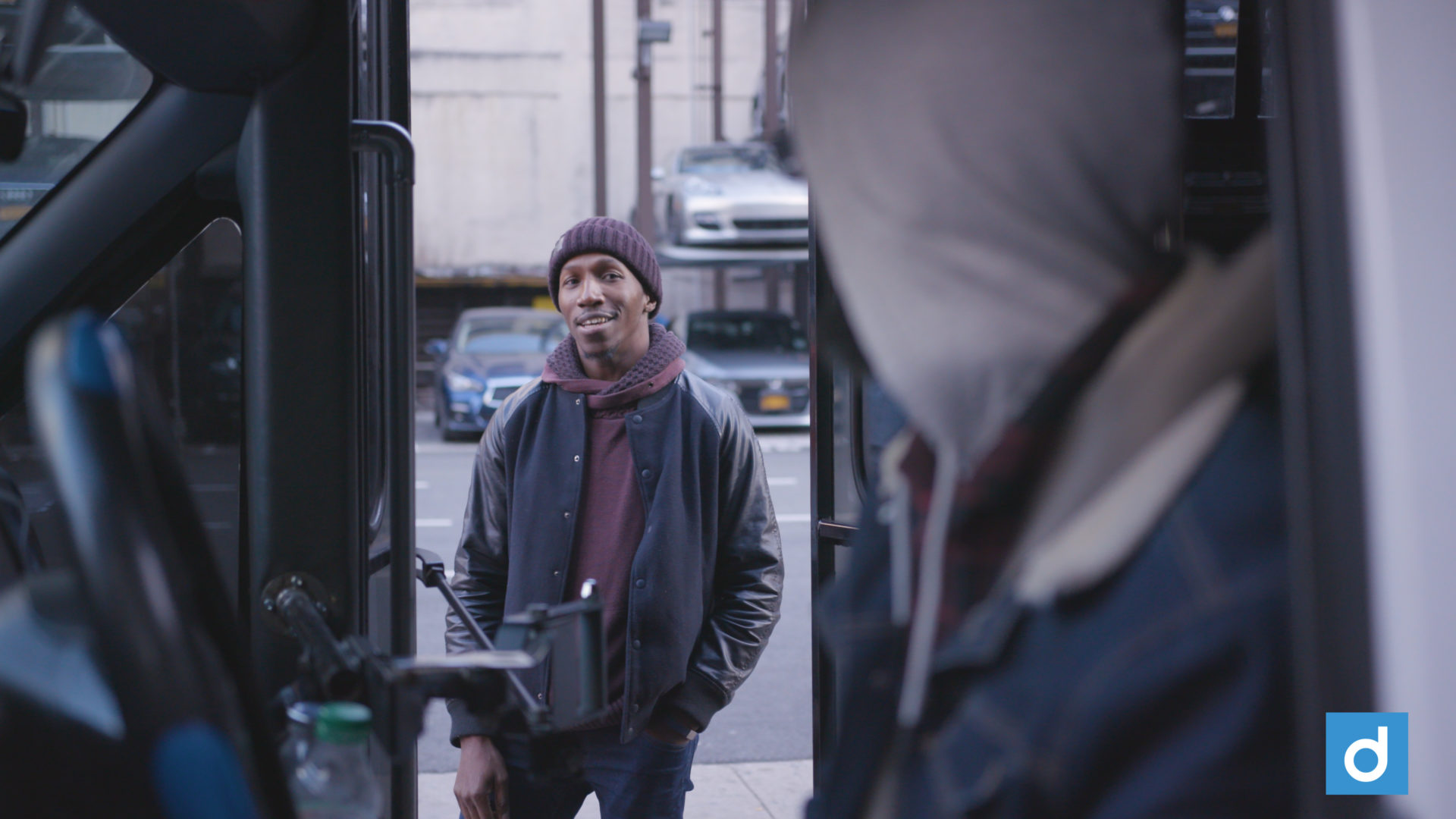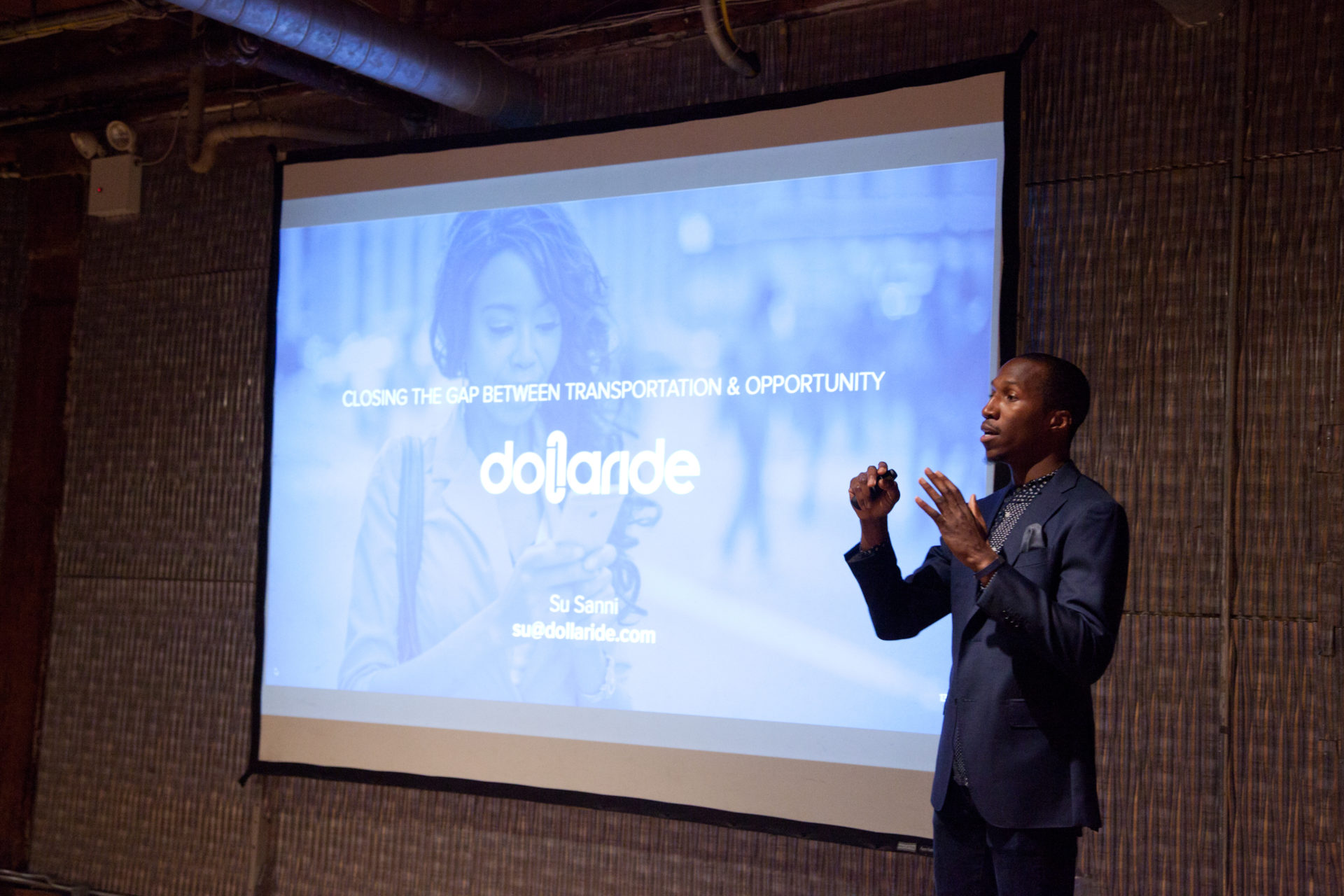
Source: Taji Morris / Dollaride
Business is more than just an idea, it’s a way of life, and if you want to be a successful entrepreneur you have to love the process. Many people strive for financial freedom, but few actually get there. This wasn’t a problem for Su Sanni, CEO, and Co-Founder of Dollaride. The steady-nerved yet humble entrepreneur has created his path to financial freedom by learning what it means to a have businessman’s mindset and sticking to it.
His company Dollaride helps riders access affordable transportation, enables drivers to grow ridership and equips businesses with tools to offer commuting options that are less expensive than existing alternatives.
Many Black business owners have great ideas, create amazing business plans, and even have substantial success in their business ventures, but still find themselves struggling to make ends meet. It’s not because of a lack of passion, but instead a lack of knowledge, especially when it comes to raising capital.
A report from McKinsey Global Institute found that Black founders only received 1% of venture capital investment funding. And that “while Black Americans are more likely to start businesses than any other ethnic group, they are up against tougher challenges from the get-go.” Their average startup capital totals about $35,000, compared with $107,000 for white entrepreneurs.
But Su Sanni didn’t have these issues. He was able to not only raise meaningful capital for his first startup but also sell it for six figures to pursue Dollaride. His success is a story any Black entrepreneur should know.
I had a chance to sit down with the cerebral CEO to pick his brain on what it takes to be a successful Black entrepreneur. Check out the interview below.
Grab a pen and pad because you don’t wanna miss these gems. Financial Freedom is right around the corner!

Source: Taji Morris / Dollaride
Why be a business owner? Why is that important to you?
Two reasons come to mind as to why I wanted to become a business owner. First off, I can say I’m probably not a great employee. There’s something about the way I want to work and how I collaborate with people that doesn’t allow me to be as good as I can be when I’m working in a big company.
There’s something about entrepreneurship where because I can pursue my own destiny and I can create things. That’s better suited for my personality than clocking in nine to five, working for someone else, and kind of being confined to that structure.
And the second thing is I’m very clear about how much money I want to make, and there are no jobs that will allow me to make as much money as I can as a business owner and entrepreneur.
I wanted to align myself with the track that would lead me to the financial goals that I had for myself. Entrepreneurship or owning a business gave me that ability.
It seems like you started with specific goals you wanted for your life, and then it kind of aligned with being an entrepreneur and business owner. Does that kind of sound right?
That is absolutely right. The goals that I’ve had personally were more aligned with owning a business and entrepreneurship than they were with being an employee at a company.
Let’s talk about your startup. What is Dollaride?
Dollaride is a technology company that helps businesses fill public transit gaps.
The whole premise behind the business is that public transportation is not accessible and is not equitable for most people.
Even in major cities like New York, a lot of people, like over a million New Yorkers don’t really have great access to the subway or bus lines. And most of these routes on the buses and the subway go to Manhattan, but if you live and work in the Bronx, you might not really even use the subway or deal with the buses.
So there’s something about AI transcription gaps from public transit that creates a whole new opportunity for private businesses to solve these issues. And that’s where I wanted to build a company that can help smaller businesses fill these public transit gaps. And that’s what Dollaride ultimately does. We partner with small business owners who have vehicles and drivers, and then we help them find passengers and contracts and businesses to provide a transportation service.
I heard you talk about a little bit about there being a need there. Was there anything else that made you choose to because there are needs everywhere, right? There are needs in a lot of different places, especially in our communities. So why do transportation industry?
So I chose transportation because beyond seeing the need and also experiencing how crappy it is when you’re living in the city and you got to walk a mile just to get to the subway, that’s how I grew up.
But the key thing for me that made me want to build a business in this was that I found that I had two uncles who had successful businesses in the transportation industry. When I peeled the layers of the onion when talking to them about how they built their companies, it made me realize that this is a very down to earth, like, simple business to operate if you’re entrepreneurial. Because I come from the tech space and we’re in the 21st century, I thought I could supercharge this type of business through technology.
So that’s what really motivated me to get into the transportation industry. I just thought I was capable and had an unfair advantage since it was already the family business for me.
Little tangent. My brother sent me an article about Nepotism, which was really interesting, black people kind of looking down on Nepotism, the idea of Nepotism, when a lot of major companies, businesses, corporations, that’s a part of what they do. I mean, why not if you got family that’s in the business, right? Why not connect? Why not help the legacy, right?
It’s funny that you say that, but I think a lot of people, maybe especially black people, we hate Nepotism because we’re often on the bad side of it. We can’t get the job because Johnny gave his little nephew the position and not us. But I guarantee you, the more of us who get in positions of power where we can employ people, of course, we’re going to put on our nieces, our nephews, our sons, and daughters into positions where they can get a leg up because they know the boss, right? So a lot of this stuff is natural. There should be some checks and balances so that we all do good work and we do things ethically, but there’s no other better feeling.
Am I correct when I say you sold the business as well?
Yes, you are correct.
Talk to me a little bit about that experience. What did you learn from that experience, and how do you think that has made you a better entrepreneur?
This is a great question. The fact that you’re asking it makes me realize that there needs to be a lot more content about this type of stuff.
Like the full lifecycle of an entrepreneur and what happens when you get an exit or when you sell your businesses. Because this is like the stuff that dreams are made of and why people should seek business opportunities.
But long story short, I started WeDidIt, my last company, with some friends back in like 2012 and we ran that business for about eight years. I got fortunate to get to a point where the company was operating and bringing in some decent revenue and profit. And then we got acquired by a larger business in our industry.
Without going into so much detail, when we got acquired, I got a high six-figure check for selling the business, and then I got a contract for employment with the company that acquired us for three years. So what happens with a lot of acquisitions when you sell your company is they’ll give you’ll have a mix of cash and equity.
So when you see the headlines of a business getting bought for 100 million, a lot of times it’s not 100 million in cash. It’s like 20 million in cash, but then 80 million in equity. And what happens with the equity is, over time, you can earn more cash as you work with the acquiring company and you become an employee of that business and you continue to hit goals.
So that’s what ultimately happened to me and my co-founders of the last business, and it was transformational for me and my life and my family.
Case in point when I sold the business and I got the quick bag, immediately my mind changed about my relationship with my girlfriend, and I thought, okay, now I’m in a position where I can propose. And then soon after that, we started family planning and having kids. All these cascades of positive things happened once I was able to realize the fruits of my labor as an entrepreneur when selling that first business.

Source: Taji Morris / Dollaride
That’s interesting, man. I’m glad I asked that question, because your answer was very informative, and I think it’s telling. We don’t know any of this stuff.
I learned it all along the way. Like, I learned it while doing it, which is mad stressful because at every moment when you’re going through an acquisition, you feel like you could just say the wrong thing or send the wrong document, and now the whole deal is over.
There’s a lot to be uncovered about how businesses go through their whole life cycle. And this question is a good teaser. There’s a whole lot of stuff underneath the iceberg that’s worth looking into.
What advice would you have for a young black man who just wants to start a successful business? I know there’s so much to tell, so maybe a better way to phrase this question is what would you tell yourself fresh out of college? Knowing what you know now, what advice would you give yourself?
Wow, so there’s like at least two pieces of advice I would give myself. The first one is, that there’s a time to learn and there’s a time to earn. There’s an article I read years ago that reminds me of this concept. But basically when you’re young and you don’t have a lot of major responsibilities like a house, kids, like older family members that you got to financially support like you don’t typically deal with those things when you’re under 25 years old.
When you’re at that age, you should be seeking employment opportunities that allow you to learn a lot and opportunities where you’re risking a lot, where the pressure is really high to perform because you’re going to grow so much more in those situations and it’s going to force you out of your comfort zone and help you build the skills to be a better entrepreneur.
Seek out working at startups, seek out working in sales, seek out working as an apprentice with somebody who has really great skills. That’s your time to learn. And then when you get a little bit older, now that you have the knowledge and the network and the contacts, you can really hyperdrive your earning power. That’s the first thing I would tell somebody young.
The second thing is to try to identify and work on skill sets that will make you unique. Ideas are a dime a dozen. Everybody got ideas.
There are skill sets that you can attain that will make you a valuable person and a dangerous entrepreneur if you focus on gaining those skills and pursuing your skills. So do the hard things. Pursue the novel things.
Do you have a favorite saying or mantra that you live by or something important to you? And if so, what is it? And why did you choose that?
I absolutely do. It’s actually tatted on me, on my arm. But I have a tattoo that says, “If you will it, it is no dream.” It’s a quote from Theodore Herzl
It’s basically saying that your effort is what creates reality. And if you put the effort, if you will, if you use your will, it will no longer become a dream, it will become reality. So that’s something that I think about all the time. It’s what allows me to pursue things that seem risky. It helps me get out of my comfort zone.
SEE ALSO:
These Powerful Black Women Are Dominating The Sports Business World
Made For Adventure: How Black Business Owner Ade Neff Is Making His Community More Beautiful
The post The Mindset Of An Entrepreneur: How This Black Man Achieved Financial Freedom Before 40 appeared first on NewsOne.

